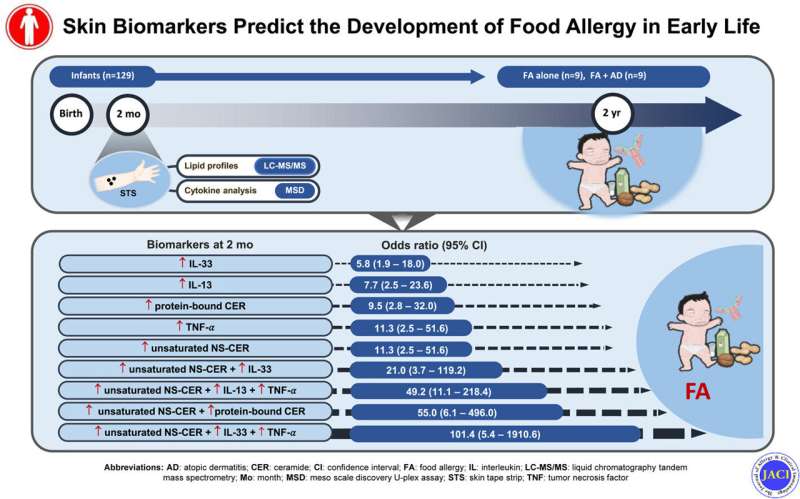This article has been reviewed according to Science X's editorial process and policies. Editors have highlighted the following attributes while ensuring the content's credibility:
fact-checked
peer-reviewed publication
trusted source
proofread
Researchers discover skin biomarkers in infants that predict early development of food allergies

Food allergies occur often in childhood and can be severe or even fatal. Researchers at National Jewish Health are working to develop a program to prevent food allergies and have now identified early predictors of the condition.
During a recent study just published online in the March 2024 issue of the Journal of Allergy and Clinical Immunology, skin tape strips were collected from the forearms of newborns at the age of two months, an age before there are any signs of food allergies.
National Jewish Health researchers developed the skin tape sampling technique, which is non-invasive and gentle for these very young patients. The superficial proteins on the skin and the lipids bind to the tape, and then the tape is extracted to study the details of what is found on the skin. Children were clinically monitored until they reached two years of age to see if allergies would develop.
"We know that the immune system underneath the skin alters the skin barrier. With our painless skin tapes, we know if proteins sitting on the surface of the skin are abnormal," said Evgeny Berdyshev, Ph.D., a researcher at National Jewish Health and first author of the study. "If there were abnormal lipids and abnormal proteins on the skin, that is an early sign of what can eventually lead to atopic dermatitis and food allergies."
"Ultimately, we want to identify people at risk for food allergy and address skin barrier abnormalities early to prevent the development of these conditions," said Donald Leung, MD, head of the Division of Pediatric Allergy & Immunology in the Department of Pediatrics at National Jewish Health, and senior author of the study.
"This is just the first step," said Dr. Leung. "We now have a biomarker for atopic dermatitis and food allergy—the abnormality is abnormal lipids, microbes, and proteins. We are now testing newborn babies to determine whether we can prevent this abnormality. We put a lipid cream on the skin of the study participants so it hopefully can penetrate the skin and infuse it with fatty acids. We are working to develop an anti-inflammatory cream as a result of this study."
More information: Evgeny Berdyshev et al, Skin biomarkers predict the development of food allergy in early life, Journal of Allergy and Clinical Immunology (2024). DOI: 10.1016/j.jaci.2024.02.014




















